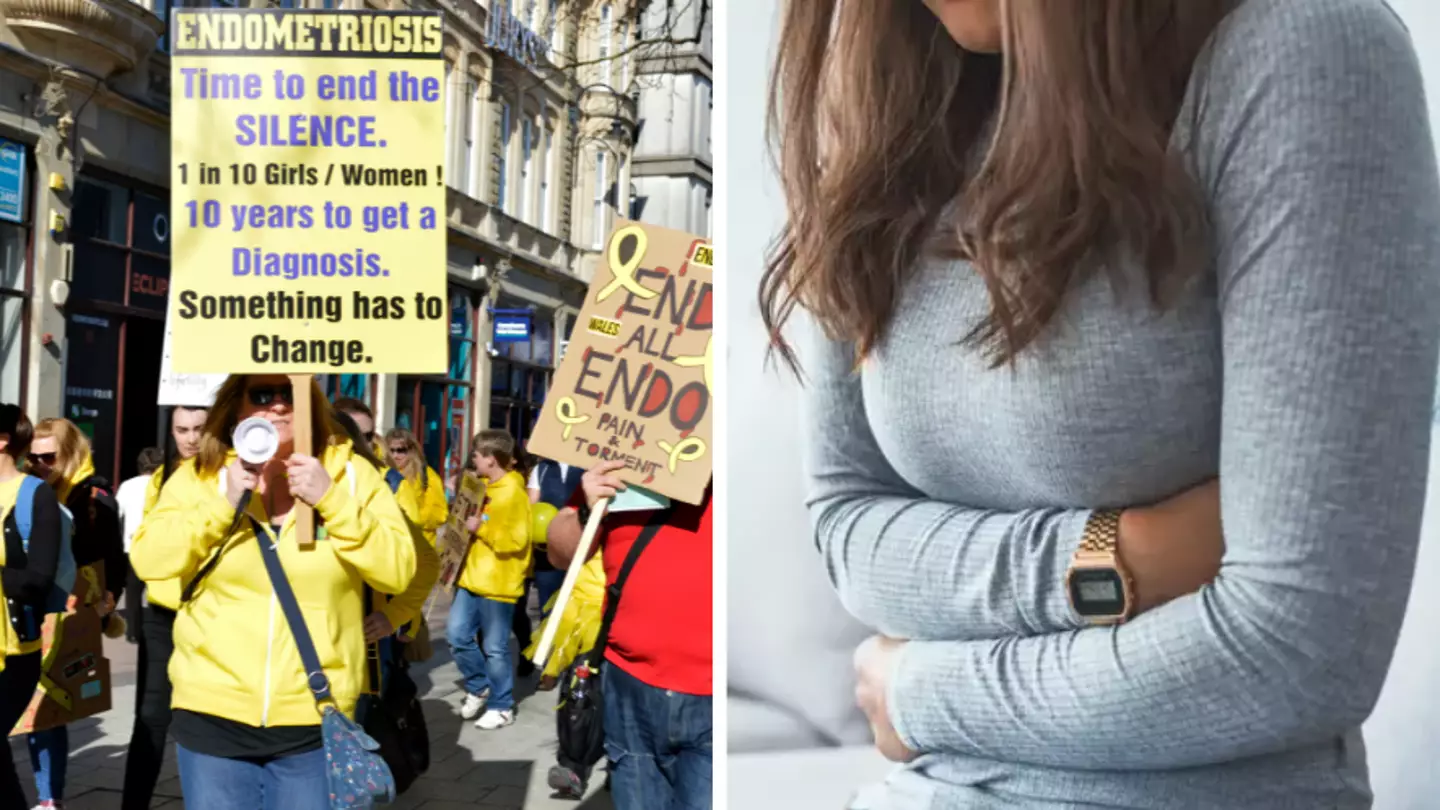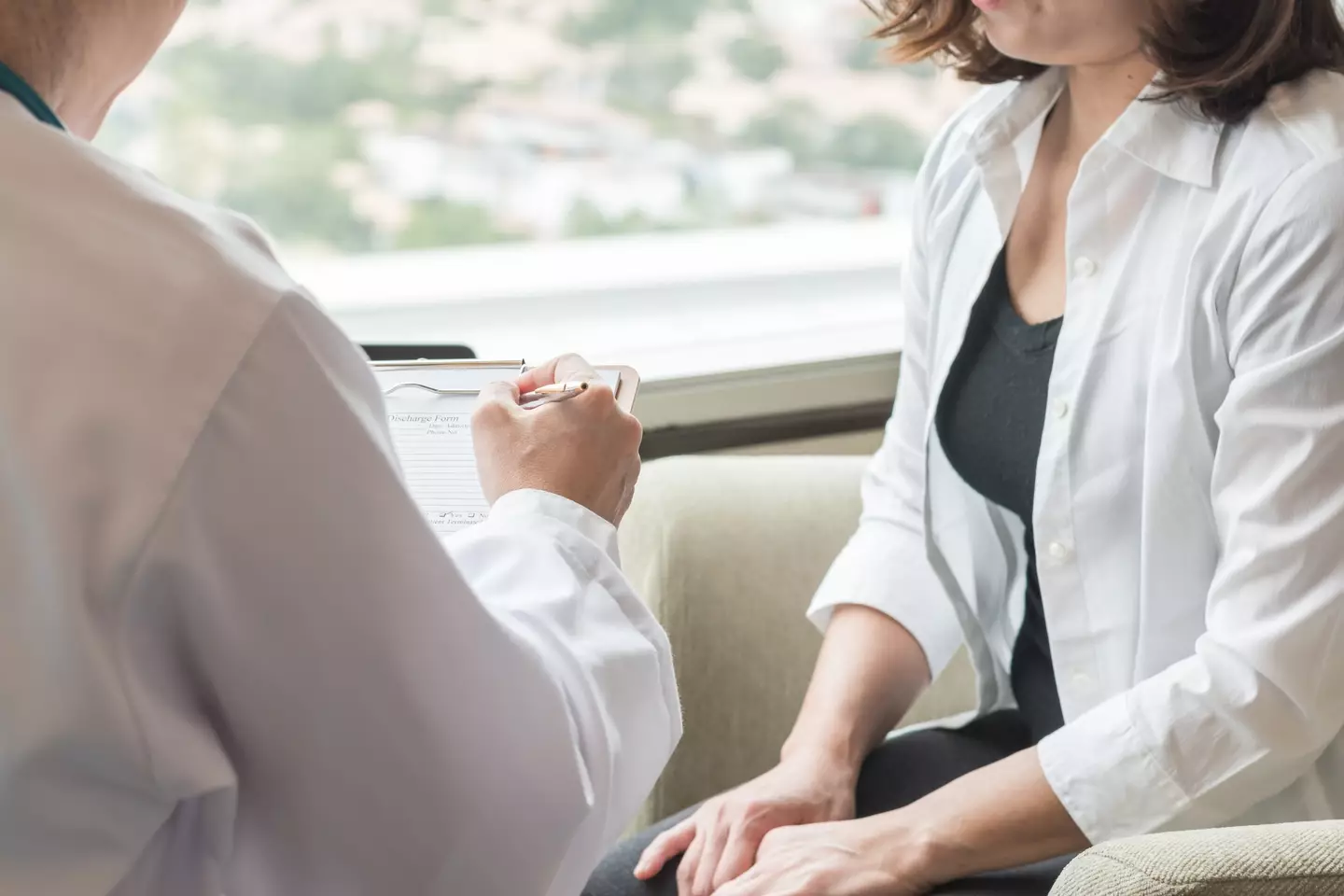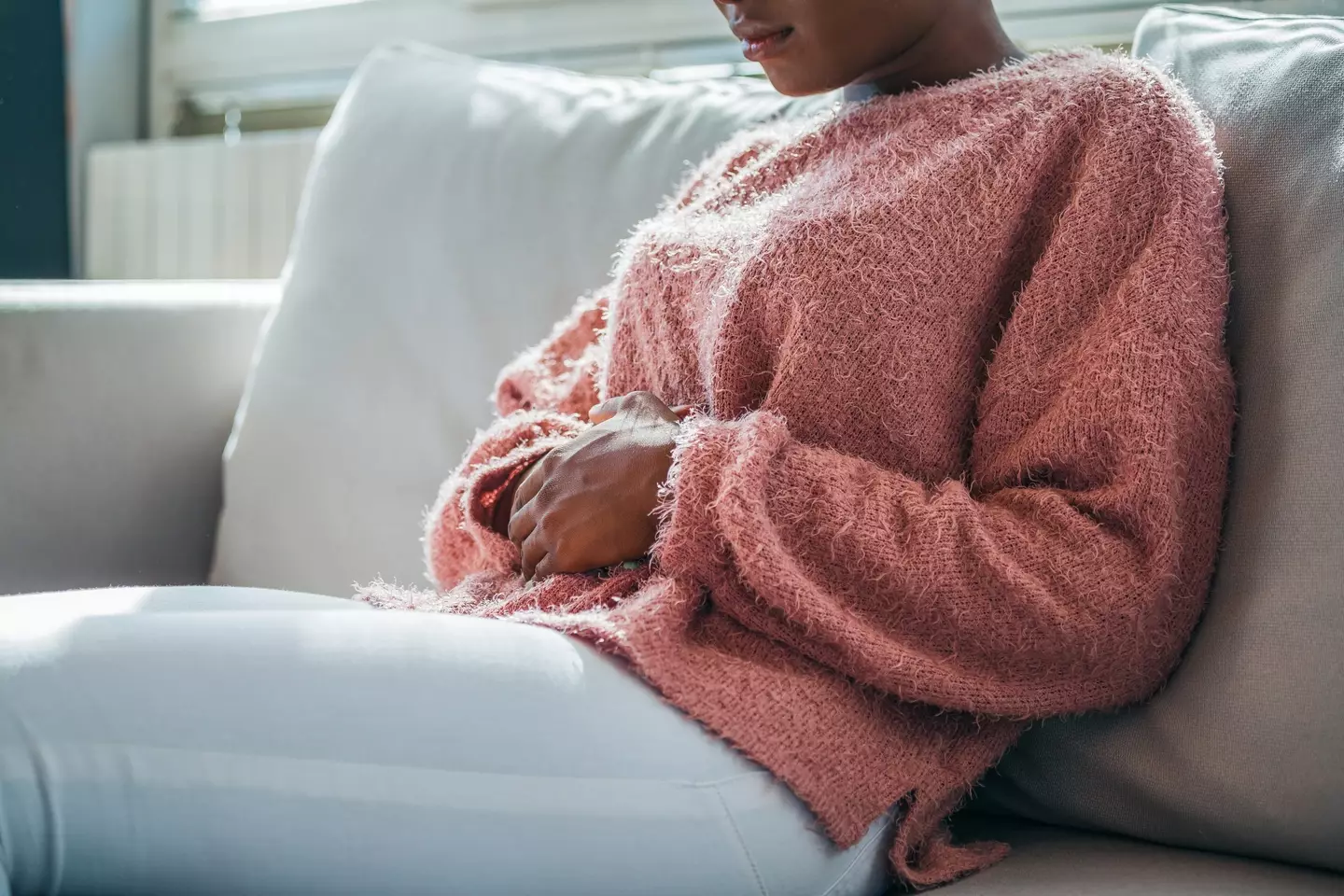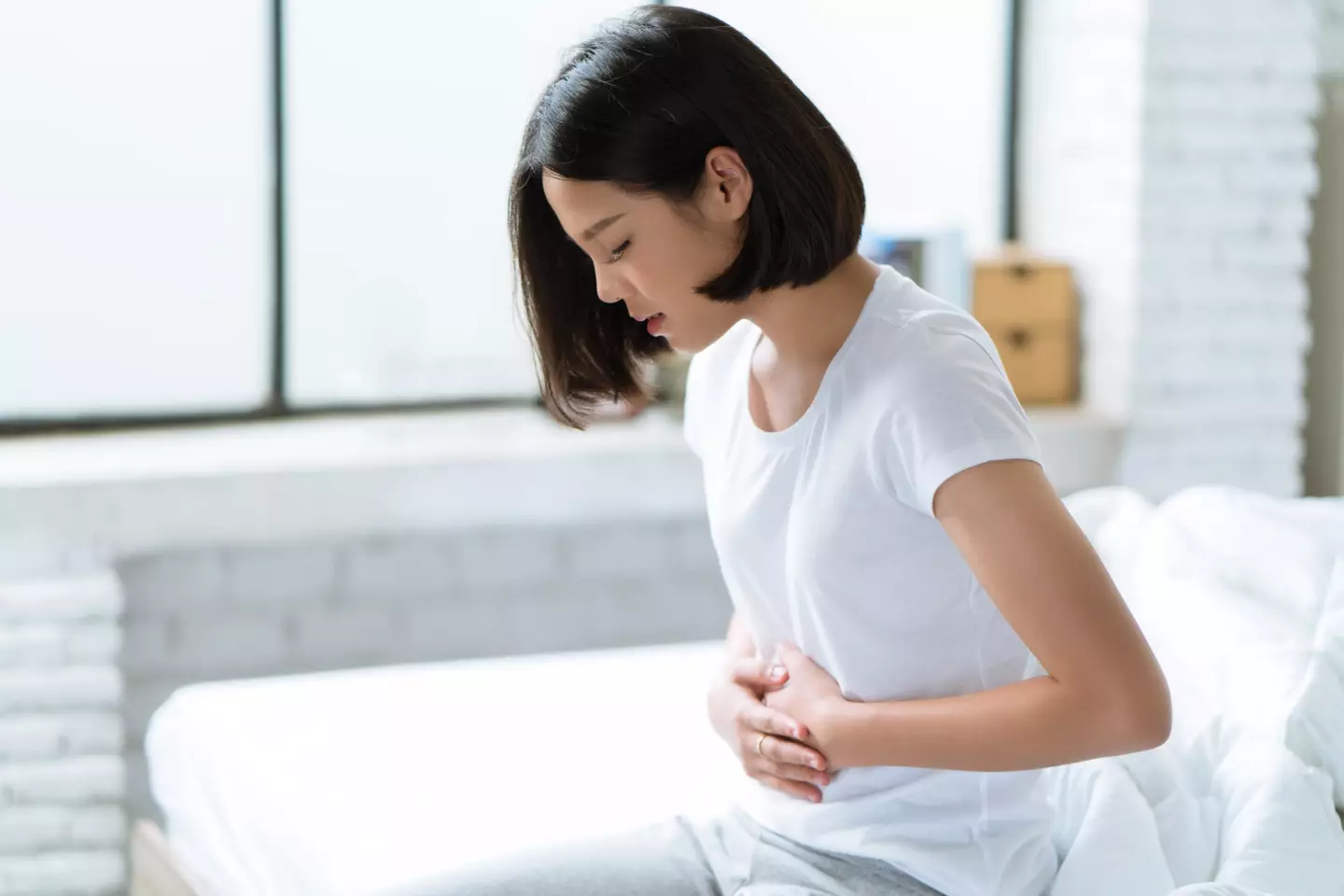
Words by Emma Kemsley
Katherine Brooks looked around her at the classroom. Her teacher had asked who had started their period and Katherine was the only person with her hand in the air. The shy 11-year-old’s cheeks flushed as she felt the eyes of 30 other children on her.
But it wouldn’t be the last time that Katherine’s periods would cause her misery. From vomiting at school to doubling over in pain and passing out at family events, Katherine battled two years of painful periods before plucking up the courage to see a GP at the age of 13.
“They told me it was hormones,” said Katherine, now 33, from Nottingham. “But I knew something was wrong. I couldn’t function.”
Advert
It would be another excruciatingly painful five years before she received a diagnosis of endometriosis.

Endometriosis is a condition where tissue, such as the lining of the womb, grows in other areas of the body – usually the ovaries and fallopian tubes. However it can also affect organs such as the bladder, colon, bowel and lungs.
Yet despite the crippling symptoms many patients report feeling overlooked or dismissed by medical professionals.
'Unhelpful'
In 2020 the All-Party Parliamentary Group (APPG) on Endometriosis released a report on the condition which found it takes an average of eight years from the onset of symptoms to receive a diagnosis. It also revealed almost two thirds (58 per cent) of patients will visit their GP over 10 times before getting a diagnosis.
Katherine spent the next three years going back and forth to the GP only to be told it was “part of growing up.” Due to sheer persistence, at the age of 16, she was referred for an ultrasound which revealed a small ovarian cyst.
“The GP said it was the likely cause of pain, but the painkillers offered didn’t help,” added Katherine.
She continued to visit her GP every other month for two years. At age 18 she secured a gynaecology referral and underwent a laparoscopy; a keyhole surgery which allows a surgeon access to the inside of the abdomen and pelvis. She was finally diagnosed with endometriosis.
“I was riddled,” she explained. “The endometriosis was removed via laser, but I still had issues. Three years later I needed another surgery.” Katherine had four laparoscopies to treat endometriosis during her twenties, eventually being diagnosed with adenomyosis too; a condition that causes endometrial tissue to grow in the muscular wall of the uterus.
The APPG endometriosis report found that half of sufferers found their GP ‘unhelpful or very unhelpful’ with regards to seeking treatment. And despite ongoing endometriosis awareness campaigns, diagnosis still takes the same length of time it did a decade ago.
'The consultant shrugged his shoulders'
From the age of 14, Lauren Harrison, from Somerset, suffered with horrendous period pain and heavy bleeding. She visited her GP “dozens of times” but received no treatment other than mild painkillers.
In her early twenties, Lauren experienced agonising pain during sex. “It was awful, I was in tears,” she said. “I went to the GP, and I was referred for an ultrasound, but as it didn’t show anything, there was no further investigation despite my symptoms getting worse.”

Lauren continued to manage symptoms with painkillers. It wasn’t until she relocated to a different county, and changed GP practices, that she eventually received a gynae referral and underwent a laparoscopy which confirmed endometriosis. All in all, it took eight years to get a diagnosis.
A few months later the pain returned. “I visited the GP again. She Googled endometriosis which I found alarming. She was so dismissive. I was sent to an osteopath but there were no issues. It felt like a box had been ticked.
“I was referred to gynae again, but the consultant shrugged his shoulders, and asked what I expected him to do about it. I felt like I had to resolve my own pain.”
Lauren took matters into her own hands by controlling her diet. She became gluten free and eliminated alcohol but claims it took over her life and affected her mental health.
“Throughout my 14 years of visiting the GP and gynaecologists, not once has anybody asked me about my diet and lifestyle, and how I am helping myself manage my chronic illness.”
After multiple visits to her GP, Lauren was again referred to gynaecology and received a second laparoscopy. Her endometriosis was now significantly worse and affected her ureter and rectum.
Three years later, Lauren returned to her GP multiple times again, despite her medical history, before being referred for a third laparoscopy which will take place in the spring.
Lauren said: “I had to be persistent for a referral, but I was made to feel like I was bothering my GP.
“I was shocked when I [later] found a GP who understood what I was going through. With education, knowledge and empathy, she was able to help.”
Fifteen years for a diagnosis
In some cases, it can take even longer to get a diagnosis. Jodie Hughes, 37 from Portsmouth, suffered with heavy and painful periods from age 11 but wasn’t diagnosed with endometriosis until she was 26.
She visited the GP on multiple occasions before securing a gynae referral and was diagnosed via a laparoscopy in 2012 – 16 years after her symptoms started. She has since had a hysterectomy to remove her ovaries, fallopian tubes and cervix but continues to be in pain daily.
_(1).JPG)
“Endo has taken so much from me, I have lost a husband, a career, and many friends due to the condition.”
For people like Jodie – who now runs Jodie runs Endometriosis South Coast – difficulty in securing a referral for laparoscopy is widely considered to be one of the biggest barriers to a successful diagnosis.
The NHS states that “given the invasive nature of a laparoscopy and the varying degree to which women experience symptoms, it can be more appropriate to treat mild symptoms and reserve a laparoscopy for women with more significant symptoms.”
There is also the issue of a lack of awareness among patients themselves. Rozie Corbett, head of development at Endometriosis UK, told Tyla: “Public understanding of endometriosis remains a barrier to getting a diagnosis.
“Recent polling we did shows that 89 per cent of women aged 16-24, and 76 per cent of all women, would put off going to the doctor if they were experiencing painful periods which were interfering with their day-to-day activities.
“Many of those with endometriosis report having been told that before getting diagnosed that having painful periods is 'normal' or 'just part of being a woman', meaning they felt discouraged from seeking help.”
But the fact remains that many patients still feel dismissed and misunderstood by their GPs.
Cambridge-based consultant gynaecologist and endometriosis surgeon Mohamed Mabrouk recently launched an educational course targeted at GPs to provide additional endometriosis training in 2020.
The webinars and face-to-face meetings are aimed at “teaching GPs to listen and intercept patient symptoms and help them take the right pathway.”

He said: “We need to cut the vicious cycle and create communication between GPs and consultants. Educating and collaborating with GPs is one of the ways to get quicker diagnosis. It helped GPs hear patients’ complaints in a new way.”
Mr Mabrouk reports seeing an increase in endometriosis referrals at his Cambridge endometriosis clinic following the workshops.
'Poor experience of healthcare'
Diagnosing endometriosis continues to be challenging. Many patients visit their GP on multiple occasions with endometriosis symptoms before being referred for further examination or ultrasounds which can often leave them feeling unheard and frustrated. Add to this increased NHS wait times, many women are left suffering in pain.
Education of the disease for both medical healthcare professionals and the public, plus increased awareness, remains critical to improve diagnosis time.
When contacted for comment by Tyla, an NHS spokesperson said: “While the diagnosis of endometriosis can be complex and may take time as many other conditions cause similar symptoms, we know that it can have a debilitating impact on the physical and mental health of women who suffer from it.
“Anyone who thinks they have symptoms can access more information on NHS.uk and if worried, they can contact their GP practice for advice, treatment and referral for further investigations so that symptoms can be treated as quickly as possible.”
Dr Anne Connolly, clinical lead for women's health at the Royal College of GPs, said: “It’s never easy to hear that some patients with endometriosis report having a poor experience of healthcare, including receiving a timely diagnosis, but GPs will always try their best to consider any physical, psychological and social factors potentially affecting the health and wellbeing of our patients when formulating a management plan.”